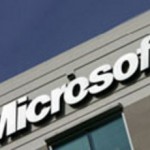 Los Angeles — Microsoft Corp., the world’s biggest software maker, on Thursday said the variety of its software offerings helped its fiscal first-quarter profit edged up 2 percent, sustained through economic uncertainty that beats analysts’ projections as demand for Office and the Xbox video-game console held up amid the economic slowdown.
Los Angeles — Microsoft Corp., the world’s biggest software maker, on Thursday said the variety of its software offerings helped its fiscal first-quarter profit edged up 2 percent, sustained through economic uncertainty that beats analysts’ projections as demand for Office and the Xbox video-game console held up amid the economic slowdown.
Analysts surveyed by Thomson Reuters expected profit of 47 cents per share on $14.8 billion in revenue. Microsoft posted 48 cents per share.
In the three-month period that ended on Sept. 30, Microsoft’s first-quarter earnings rose 2 percent to $4.37 billion, or 48 cents a share, from 4.29 billion dollars, or 45 cents a share, in the same period last year, the company said today in a statement.
Meanwhile, its sales rose to 15.1 billion dollars, the software giant said. That topped the 47-cent average of estimates compiled by Bloomberg. Microsoft forecast annual earnings of as much as $2.10 a share, compared with the $2.11 projected by analysts.
The report indicated profit will hold up better than some investors anticipated as customers deal with the economic crisis. The company plans to cut $500 million in spending by trimming hiring, travel and marketing, Chief Financial Officer Chris Liddell said. Office software sales rose 20 percent last quarter, while a price cut accelerated demand for the Xbox.
“We were satisfied with the quarter, and we believe their outlook for the year, given a very uncertain economic outlook, is very strong,” Jim Hardesty, president of Hardesty Capital Markets in Baltimore, said in a Bloomberg Television interview. “They are doing what they should do in an environment that is relatively tough.”
Sales this year will be $64.9 billion to $66.4 billion, compared with the $66.7 billion predicted by analysts.
Microsoft, based in Redmond, Washington, beat Wall Street’s expectations on both counts. Despite the numbers, Microsoft only posted a modest 1.9% increase in net income as compared to the same quarter a year ago. In the fiscal first quarter of 2008, revenue was $4.2 billion as compared to $4.3 billion in 2009.
Microsoft said its annuity sales, which are built mostly on multi-year software maintenance contracts, grew by more than 20% fueled by growth in the client, business and server and tools divisions.
“We, like most companies, saw a slowdown at the tail end of the quarter in particular,” Liddell said in an interview. “We are now taking a more conservative stance on the balance of the year.”
Liddell said the worst hit among Microsoft’s customers in the just-concluded quarter were small- and medium-sized businesses that “perhaps are more affected by the credit squeeze and who perhaps make decisions on a month-by-month basis.”
Microsoft’s success came mostly before the economic downturn that has had financial markets in a panic recently.
But the quarter was not without chaos for Microsoft. During the quarter, Microsoft dropped its bid to acquire Yahoo while pursuing Google in the search and advertising market. Microsoft is investing heavily to make up ground on the search giant but the depth of those efforts from a financial perspective would not be reflected until later in the fiscal year.
Sid Parakh, an analyst for McAdams Wright Ragen, said Microsoft also drops the price it charges PC makers for installing Windows on laptops that cost so little.
Microsoft also said revenue from PC makers like Dell Inc. and Hewlett-Packard Co. sank 1 percent as those companies bought a smaller percentage of higher-priced “premium” versions of Windows Vista.
But Liddell said Microsoft would adjust downward its guidance for the second fiscal quarter of 2009. Microsoft had been predicting an increase in the economy for the quarter.
Now, Liddell said, “we are assuming a mild recession and a relatively modest growth rate for IT based products.”
He said the company’s strong cash flow; high unearned revenue and plentiful cash on hand would “allow us to weather any economic recession in relatively better terms than most.”
And adding a high note, Liddell said Microsoft still foresees an “increase in demand for our products that will grow revenue from single digits to low double digits this financial year.”
He predicted that growth would be judged as an exceptional performance in the current economic environment.
Shares of Microsoft slipped 17 cents to $22.15 in after-hours trading. In the regular session it added 79 cents, or 3.7 percent, to end at $22.32.


